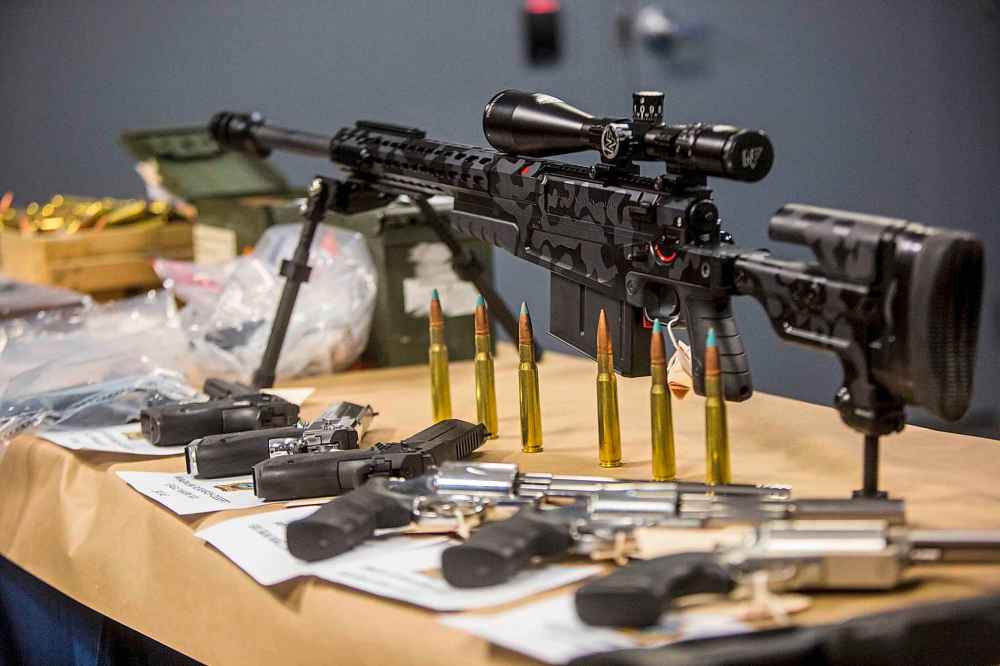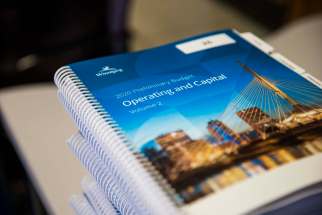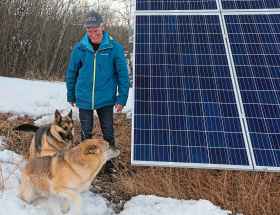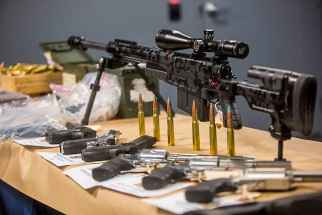Some guns seized in city have international origins
Read this article for free:
or
Already have an account? Log in here »
To continue reading, please subscribe:
Monthly Digital Subscription
$0 for the first 4 weeks*
- Enjoy unlimited reading on winnipegfreepress.com
- Read the E-Edition, our digital replica newspaper
- Access News Break, our award-winning app
- Play interactive puzzles
*No charge for 4 weeks then price increases to the regular rate of $19.00 plus GST every four weeks. Offer available to new and qualified returning subscribers only. Cancel any time.
Monthly Digital Subscription
$4.75/week*
- Enjoy unlimited reading on winnipegfreepress.com
- Read the E-Edition, our digital replica newspaper
- Access News Break, our award-winning app
- Play interactive puzzles
*Billed as $19 plus GST every four weeks. Cancel any time.
To continue reading, please subscribe:
Add Free Press access to your Brandon Sun subscription for only an additional
$1 for the first 4 weeks*
*Your next subscription payment will increase by $1.00 and you will be charged $16.99 plus GST for four weeks. After four weeks, your payment will increase to $23.99 plus GST every four weeks.
Read unlimited articles for free today:
or
Already have an account? Log in here »
Hey there, time traveller!
This article was published 06/03/2020 (2107 days ago), so information in it may no longer be current.
Police now have a clearer idea of the origins of guns seized during criminal investigations in Winnipeg and, to their surprise, some weapons confiscated last year can be traced back to the United States and as far away as Europe and South America.
Winnipeg Police Chief Danny Smyth said the service has recently tapped into the United States’ Bureau of Alcohol, Tobacco, Firearms and Explosives’ ballistics identification and firearms tracing system, and the new partnership with the ATF has allowed officers to understand the sources of guns entering the city.
“We’re seeing guns coming all over from the west and the east, interestingly enough, right around the Connecticut area on the eastern seaboard, quite a number of guns have found their way up into our country from that area, and we don’t know why that is,” Smyth told the City of Winnipeg police board Friday.

“That was surprising to me: that we’re seeing guns sourcing from pretty much everywhere,” said Smyth. “It’s been an interesting picture that’s emerged.”
Last year, 788 guns were seized by Winnipeg police in the course of criminal investigations. In 2018, 778 guns were confiscated, up from 724 the year prior.
A police spokesman said he could not provide statistics on the geographic origins of guns seized last year, or even how many entered the country from abroad, citing potential impacts to ongoing prosecutions.
However, Smyth said guns also continue to be stolen locally and modified, and moved into the province from other parts of Canada.
Of the weapons seized last year, 28 per cent were restricted firearms and 28 per cent were “other firearms,” he said. Other firearms can include modified shotguns and rifles, or modified airsoft guns capable of shooting projectiles. One per cent, or eight, of the firearms seized were prohibited firearms, he noted.
“We’re seeing guns coming all over from the west and the east, interestingly enough, right around the Connecticut area on the eastern seaboard, quite a number of guns have found their way up into our country from that area, and we don’t know why that is.”
– Winnipeg Police Chief Danny Smyth
Smyth said police have also noted the local manufacture of guns — 12 per cent of weapons seized last year were improvised firing devices, also known as zip guns — and have investigated cases of straw purchases, when a firearm is purchased legally and sold to another person.
“If you asked me this question a year ago, I would have said most of our guns were probably stolen locally or stolen in rural areas… and then modified,” Smyth said.
“Now we’re seeing more than that. We’re seeing some smuggled guns, we’re seeing some straw purchases, and we’re seeing some manufactured guns.
Smyth said the service has made use of federal funding and recently purchased ballistics analysis equipment to assist the firearms investigative enforcement unit in testing and tracing firearms. However, it’s still too early to know if the number of illegal guns coming into Winnipeg from abroad has increased.
“We’re just being able now to set a baseline to know what to expect,” Smyth said.
danielle.dasilva@freepress.mb.ca

Our newsroom depends on a growing audience of readers to power our journalism. If you are not a paid reader, please consider becoming a subscriber.
Our newsroom depends on its audience of readers to power our journalism. Thank you for your support.
History
Updated on Friday, March 6, 2020 7:37 PM CST: corrects typo








